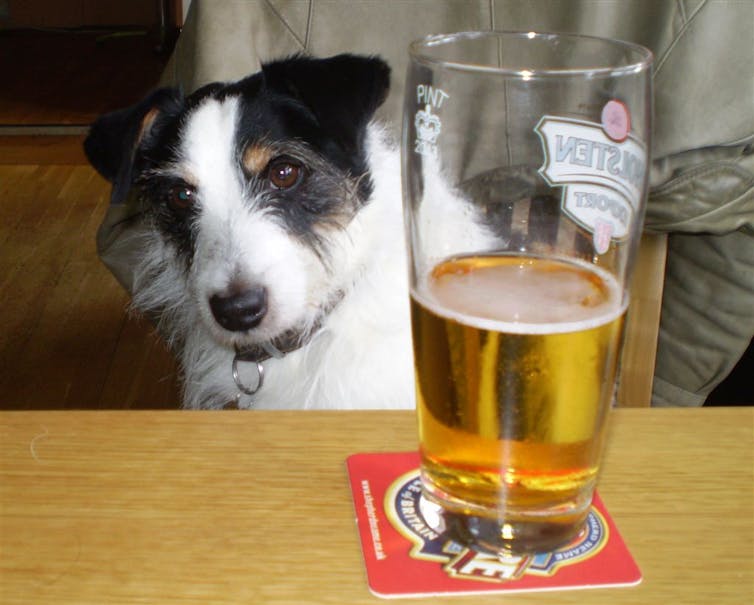The Ivy House, Author provided
British pubs are dying. In 2001, the UK counted 52,500 pubs. In 2018, that figure stood at 38,815. Now the fall-out from coronavirus will likely devastate the industry further as pubs struggle to reopen safely and generate enough income to survive.
This dramatic rate of closure signifies a dangerous risk for many historical pubs all over the UK, some of them dating back centuries, representing a cornerstone for many communities. In rural areas, pubs are often the last remaining business open that can offer a social hub for people.
Keen to see this vital social lifeline preserved, many groups have decided to take action and save their local pubs, converting them into collective properties and community hubs. Research by my colleagues and me shows how these projects foster more socially minded behaviour, collaboration and trust. It also shows how community-owned pubs (COPs) support their communities.
Public houses are fundamental and iconic institutions of British culture. For centuries they have existed as vital social hubs for both locals and travellers. Alongside many roads and at the heart of every village, taverns and inns provided accommodation, food, company and typical British ale.
Brewing production also took place in many of these facilities named alehouses. During the reign of Henry VII, these businesses became known as public houses or more simply, pubs. Despite their deep roots in British history, pubs have been suffered a structural crisis in the last 20 years for a variety of reasons including crippling business costs and increased taxation, changes in alcohol consumption habits (such as trends in wine drinking and cocktails) and cheaper prices at off-licences and supermarkets.
Community-owned pubs pubs take a different approach to the traditional business model. They allow local groups and charities to use their spaces for free. They host events and activities proposed by local residents and generally create a welcoming atmosphere for everyone. Shareholders and customers feel a particular bond with these places because their recognise the community value embedded into them.
How communities save their pubs
Our work examined three cases study in London: The Antwerp Arms (1822) in Tottenham, The Hope (1855) in Charshalton and The Ivy House (1871) in Nunhead. These three pubs have similar histories and are good examples of how a community-owned pub works and thrives.
In all three cases, the pubs were previously owned by big pub companies. Under previous managements, all three were poorly run and lost their bonds with local communities. Then the owners decided to sell the properties to developers for converting into flats and homes.
Keen not to lose such historic buildings, local communities mobilised to campaign against the demolition and figure out solutions for saving these places. Thanks to the forward-looking action of some local residents, who went on to become leaders of these initiatives, communities were able to raise enough funds to firstly acquire the licences and then the actual properties.
Today these pubs are collectively owned by local shareholder groups. The Antwerp Arms has 360 members, the Ivy House has 371 and the Hope has 48. No one expects returns on the capital invested. Instead, according to the shareholders we interviewed, their main aim for investing was to rescue the pub for the community.
Another key factor for the success of these initiatives (in particular the Ivy House and Antwerp Arms), has been the possibility to list these pubs as an “asset of community value”, which has allowed groups to save these buildings from market speculation and plan collective action for their reconversion.
For each one, activists decided to reopen the pubs providing food and drink as usual, but they have also enriched them with new activities devoted to specific community needs. These three COPs host local charities meetings for free, raise money for local initiatives, select local producers for their food and ales menu, employ local people, provide after-school activities, hold bike repair workshops and organise cultural events. Anyone can propose ideas to the board and develop them within the community pub.
How COPs enhance community life
Interviews with founders, shareholders and customers show how these long-term projects have provided an appreciation of history and brought a sense of purpose and achievement, renewing and boosting the sense of community.

Les Chatfield/Flickr
Activists and shareholders have been able to preserve a significant place which represents for them a cornerstone in their community history. They have also been successful in generating a new social identity of local community in highly dense urbanised neighbourhoods, connecting people who might otherwise have remained anonymous neighbours. There is also a sense of getting back to the real function of pubs in terms of connecting and belonging:
Everybody perceives this as a community asset. There’s never any trouble and … it’s very safe … There is a community atmosphere with … good conversation, no TV, no radio music. In the 1960s and 1970s, English pubs were like this.
Customer, The Hope
Our findings show how participants have expanded their social interaction with other residents and reveal how things like trust and collaboration have also increased. Crucially many have come to understand how partnership and collaboration are valuable tools for figuring out common problems.
Most of all, being part of a community-owned pub enhances the experience of being part of a community, one that works together for the common good, which can achieve great things when local people unite and decide to build something positive and lasting for the future.
![]()
This research was conducted in collaboration with Jacopo Sforzi of the European Research Institute on Co-operative and Social Enterprise.










